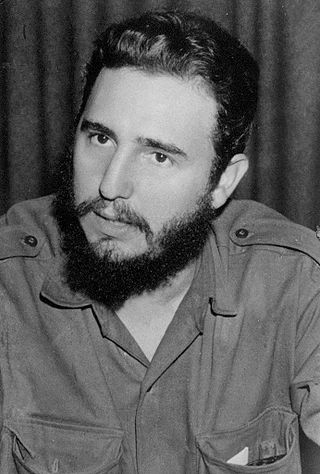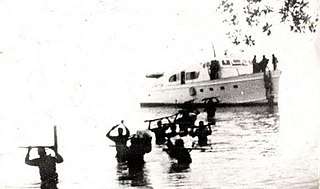Related Research Articles

The economy of Cuba is a mixed planned economy dominated by state-run enterprises. Most of the labor force is employed by the state. In the 1990s, the ruling Communist Party of Cuba encouraged the formation of worker co-operatives and self-employment. In the late 2010s, private property and free-market rights along with foreign direct investment were granted by the 2018 Cuban constitution. Foreign direct investment in various Cuban economic sectors increased before 2018. As of 2021, Cuba's private sector is allowed to operate in most sectors of the economy. As of 2023, public-sector employment was 65%, and private-sector employment was 35%, compared to the 2000 ratio of 76% to 23% and the 1981 ratio of 91% to 8%. Investment is restricted and requires approval by the government. In 2021, Cuba ranked 83rd out of 191 on the Human Development Index in the high human development category. As of 2012, the country's public debt comprised 35.3% of GDP, inflation (CDP) was 5.5%, and GDP growth was 3%. Housing and transportation costs are low. Cubans receive government-subsidized education, healthcare, and food subsidies.

Fidel Alejandro Castro Ruz was a Cuban revolutionary and politician who was the leader of Cuba from 1959 to 2008, serving as the prime minister of Cuba from 1959 to 1976 and president from 1976 to 2008. Ideologically a Marxist–Leninist and Cuban nationalist, he also served as the first secretary of the Communist Party of Cuba from 1965 until 2011. Under his administration, Cuba became a one-party communist state; industry and business were nationalized, and socialist reforms were implemented throughout society.

Cuba has had a socialist political system since 1959 based on the "one state – one party" principle. Cuba is constitutionally defined as a Marxist–Leninist state. The present Constitution of Cuba, which was passed in a 2019 referendum, also describes the role of the Communist Party of Cuba to be the "leading force of society and of the state" and as having the capability of setting national policy, and First Secretary of the Communist Party is the most powerful position in Cuba. The 2019 Constitution of Cuba identifies the ideals represented by Cuban independence hero José Martí and revolutionary leader Fidel Castro as the primary foundation of Cuba's political system, while also stressing the importance of the influence of the ideas of Marx, Engels, and Lenin.

Raúl Modesto Castro Ruz is a Cuban retired politician and general who served as the first secretary of the Communist Party of Cuba, the most senior position in the one-party communist state, from 2011 to 2021, and President of Cuba between 2008 and 2018, succeeding his brother Fidel Castro.

Granma is a yacht that was used to transport 82 fighters of the Cuban Revolution from Mexico to Cuba in November 1956 to overthrow the regime of Fulgencio Batista. The 60-foot diesel-powered vessel was built in 1943 by Wheeler Shipbuilding of Brooklyn, New York, as a light armored target practice boat, US Navy C-1994, and modified postwar to accommodate 12 people. "Granma", in English, is an affectionate term for a grandmother; the yacht is said to have been named for the previous owner's grandmother.

The Central Bank of Cuba is the central bank of Cuba. It was created in 1997 to take over many of the functions of the National Bank of Cuba, which was established on 23 December 1948 and began operations on 27 April 1950.

Julio Antonio Mella McPartland was a Cuban political activist, journalist, communist revolutionary, and one of the founders of the original Communist Party of Cuba. Mella studied law at the University of Havana but was expelled in 1925. He had worked against the government of Gerardo Machado, which had grown increasingly repressive. Mella left the country, reaching Central America. He traveled north to Mexico City, where he worked with other exiled dissidents and communist sympathizers against the Machado government. He was assassinated in 1929, but historians still disagree on which parties were responsible for his death. The 21st century Cuban government regards Mella as a communist hero and martyr.

Cuba, officially the Republic of Cuba, is an island country, comprising the island of Cuba, Isla de la Juventud, archipelagos, 4,195 islands and cays surrounding the main island. Cuba is located where the northern Caribbean Sea, Gulf of Mexico, and Atlantic Ocean meet. Cuba is located east of the Yucatán Peninsula (Mexico), south of both the American state of Florida and the Bahamas, west of Hispaniola, and north of Jamaica and the Cayman Islands. Havana is the largest city and capital; other major cities include Santiago de Cuba and Camagüey. The official area of the Republic of Cuba is 109,884 km2 (42,426 sq mi) but a total of 350,730 km2 (135,420 sq mi) including the exclusive economic zone. Cuba is the second-most populous country in the Caribbean after Haiti, with over 11 million inhabitants.
José Luis Rodríguez García was the Cuban Minister of Economy and Planning. He was also a Vice President of the Cuban Council of Ministers and an elected member of the National Assembly of Cuba. He was the Minister of Finance from 1994 to 1995. Rodríguez was Minister of Economy and Planning since 1998. He was replaced by Internal Trade Minister Marino Murillo in March 2009.
Margarita Dania Rodriguez is a former co-anchor of the CBS television broadcast, The Early Show, from December 2007 to December 2010. Rodriguez was also a substitute anchor for Katie Couric on The CBS Evening News. Rodriguez was formerly co-anchor of the Saturday edition of The Early Show in 2007.

Bruno Eduardo Rodríguez Parrilla is a Cuban diplomat and politician. He is a member of the Politburo of the Communist Party of Cuba, and has served as Cuba's Minister of Foreign Affairs since 2009.
Lina Olinda Pedraza Rodríguez is a Cuban politician and was the Cuban Minister of Finances and Prices from 2009 to 2019. She was appointed after 2009 shake-up by Raúl Castro.
Marino Alberto Murillo Jorge is a Cuban politician, economist and former military officer. He received national media attention in 2009 on his appointment as Minister of Economy and Planning following the government shake-up announced by Raúl Castro on 2 March 2009. Murillo retained this post until 25 March 2011, but was reappointed to it on 25 September 2014 to lead reform efforts in the economic sphere. On 14 July 2016 he was sacked from his post for a second time, and moved to a new role tackling market reforms.
In March 2009, President Raúl Castro of Cuba dismissed numerous government ministers.

Miguel Mario Díaz-Canel y Bermúdez is a Cuban politician and engineer who is the 3rd and current First Secretary of the Communist Party of Cuba. As First Secretary, he is the most powerful person in the Cuban government. Díaz-Canel succeeds the brothers Fidel and Raúl Castro, making him the first non-Castro leader of Cuba since the revolution.

María Elvira Salazar is an American journalist, author, and politician serving as the U.S. representative for Florida's 27th congressional district. She is a Republican assistant whip. Before entering politics, Salazar worked for the Spanish-language network Telemundo for three decades after serving as a news anchor for Miami-based WSBS TV. She has also worked for CNN Español and Univision.

Fidel Ángel Castro Díaz-Balart was a Cuban nuclear physicist and government official. Frequently known by the diminutive Fidelito, he was the eldest son of Cuban leader Fidel Castro and his first wife, Mirta Díaz-Balart.

The Ministry of Finance and Prices of Cuba is responsible for managing the public finances of Cuba, including budget, tax, treasury, price and public credit policies.
Luis Alberto Rodríguez López-Calleja was a Cuban military general, businessman and politician. He was the head of Cuba's state-run enterprise GAESA and has been described as one of Cuba's most powerful people. A key member of Cuba's Central Committee of the Communist Party, he was once married to Raúl Castro's daughter Deborah. He died on 1 July 2022, of a heart attack.
References
- 1 2 "Finances and Prices Minister Fired". The Miami Herald. 22 June 2003. 18A. Retrieved 5 January 2024.
- ↑ "Raúl Castro replaces top Cuban officials". The Guardian. 2 March 2009. Retrieved 5 January 2024.